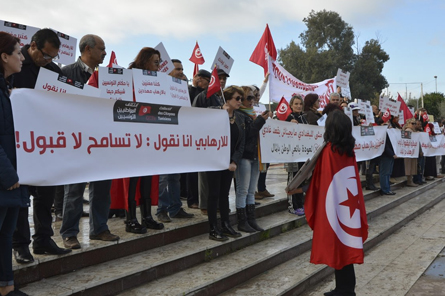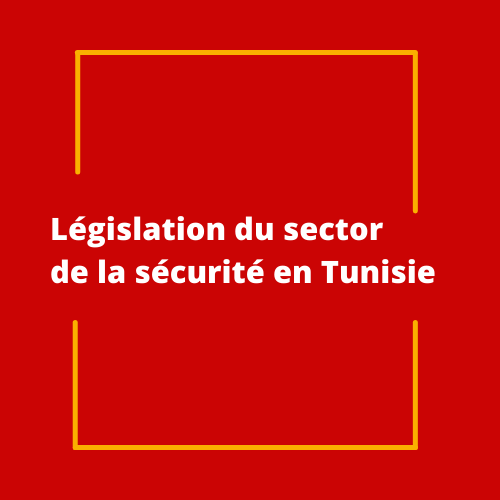Tunisia
Since 2011, DCAF has worked with key ministries, parliament, oversight institutions, the media and many other partners. Tunisia joined as a member state of DCAF’s Foundation Council in the same year. DCAF’s programs include assisting the Ministry of Interior to implement its action plan on good governance and integrity building; contributing to criminal justice reform; and addressing security needs of women and youth, including the prevention of violent extremism.
Every year, DCAF also supports the OSCE Focus Conference, which was developed as a flexible instrument for reflection and analysis of the OSCE.
Find out more about our work in Tunisia: Download DCAF Tunisia Country Strategy

Workstreams/Projects
In the first weeks following the Tunisian Revolution, DCAF offered its expertise to the transitional government. Since February 2011, DCAF has been reinforcing its cooperation with the Tunisian government through concluding agreements and developing assistance programmes with several ministries (Interior, Justice and Defence).
In July 2011, Tunisia joined the DCAF Foundation Council and became its 60th member state. In order to facilitate the implementation of its cooperation programme, DCAF opened an office in Tunis in October 2011. This office has been part of the Trust Fund for North Africa (TFNA) programme since June 2012.
The objective of the TFNA’s programme in Tunisia is to assist the authorities in establishing good governance of armed forces, police and security forces which are to:
- Operate under clear policy and legal frameworks;
- Deliver efficient services in a transparent manner, in line with the security needs of citizens;
- Adhere to the principle of rule of law, and whose individual members are fully accountable for their actions;
- Are properly managed and overseen by the executive, legislative and judicial authorities;
- Are subject to informal oversight by the media and civil society.
All of our activities in Tunisia are funded by the TFNA. To learn more about the Trust Fund, please visit www.dcaf.ch/trust-fund-north-africa.
Effective parliamentary oversight is crucial to ensuring that the mandates of security sector institutions and security providers are devised and implemented with full transparency and accountability. In its absence, there is a danger of them misinterpreting their mission and acting like a state within the state, either placing heavy strains on scarce resources or exerting excessive political and economic influence. They may hamper democratisation and even increase the likelihood of conflict.
Beside parliamentary oversight, other formal independent oversight mechanisms that exist in differing forms from one country to another, such as National Anti-Corruption bodies, Access to Information or media watchdogs etc., perform important control functions with direct links to the security sector in line with their thematic mandates.
Activities
- PARLIAMENT: support the Committee on Security and Defense (CSD) and the Committee of the Organization of the Administration and Armed Forces’ Affairs (COAAFA) to strengthen their capacity and knowledge on a wide range of topics, including the application of the state of emergency, the role of the Parliament in the budgetary and financial control of the security sector and defence procurement, monitoring and evaluation of public policies, oversight of intelligence services, etc.
- NATIONAL ANTI-CORRUPTION AGENCY (INLUCC): support the Ministry of Interior and the INLUCC improve their coordination on the protection of whistle-blowers and develop a whistle-blowers' protection manual aiming at codifying good practices and promoting awareness-establishing measures for both employees and the general public.
In order to keep citizens informed about security issues in a transparent and timely way, and to be transparent about how state institutions in charge of providing security are organized, funded, and operated, professional communication and access to information regulation and practice aiming at the highest possible standard of open government are essential . Access to information, as well as citizen participation in the development of security policies, enhances the transparency and accountability of the security sector and helps building trust.
Furthermore, effective complaints and feedback mechanisms concerning the security services can apport an important element of control and information to authorities in charge of internal and external oversight of security providers. This is particularly important for complaints related to police misconduct.
Activities
- MINISTRY OF INTERIOR (cooperation with ONSHOR): support the development and implementation of a reference framework for access to information and open data related to the security sector, particularly through the development of the ministry’s online portal.
- NATIONAL AUTHORITY FOR ACCESS TO INFORMATION (INAI): strengthen its capacity and support it develop a partnership with the Ministry of Interior on how to better access security-related information, through the provision of specific training on access to information and open data to different structures of the Ministry of Interior.
- MEDIA (in cooperation with the National Syndicate of Journalists): build the capacity of journalists to strengthen their role in SSR.
A good regulatory framework for the security sector:
- ensures that the security sector is guided by a framework of laws, policies and codes of conduct that are in line with international good practice, fit the local context and are known to security providers as well as the citizens they serve.
- outlines clear mandates and roles for security providers and security institutions. It ensures that there missions do not overlap, and that their prerogatives are clearly defined;
- establishes institutions that oversee the security sector, and endows them with sufficient rights and power to fulfil their mandate; and
- provides a basis for accountability by drawing a clear line between legal and illegal behaviour.
Activities
- MINISTRY OF JUSTICE: Strengthen its capacities on strategic planning, programming, monitoring and evaluation to review its strategic vision and five-year plan. Foster a reflection on the revision of the criminal policy.
- NATIONAL COMMISSION FOR THE FIGHTS AGAINST TERRORISM (CNLCT): accompany a strategic reflection on public-private partnerships (PPP) in the security sector.
Given the nature of the term “security” (e.g. human, national), there may be different views of what ‘security’ means for citizens and the state. The understanding of ‘security’ also differs between urban and rural areas, as it does for different social classes and professional interest groups. Developing a vision of security that is as inclusive as possible, and agreeing on how to achieve this security, requires extensive and inclusive dialogue.
Activities
- JUVENILE JUSTICE SUPPORT OFFICE: support to develop a comprehensive and coordinated juvenile justice policy, and strengthen a coordinated follow-up of minors deprived of their liberty
- YOUTH PROTECTION DELEGATES: strengthen their visibility thereby designing and developing the DGPE’s protection platform and information system
- HIGHER MAGISTRATE’S INSTITUTE: strengthen the capacities of family and children judges and justice auditors on the guarantees for respecting the rights of minors during the criminal procedure through curriculum development
- PRISON ADMINISTATION (CGPR) & FACULTY OF HUMANITIES AND SOCIAL SCIENCES OF TUNIS: contribute expertise to the joint criminology master program, on criminal justice, criminal policies and statistics, and rehabilitation policies.
- MINISTRY OF WOMEN, FAMILIES, CHILDHOOD AND SENIORS:
- Support the National Observatory for the Fight against Violence against Women in carrying out an evaluation of the justice and security sector's response to such violence;
- Support the establishment of a mechanism for dealing with perpetrators of domestic or sexual violence in order to prevent recidivism.
- CENTER FOR RESEARCH, STUDIES, DOCUMENTATION AND INFORMATION ON WOMEN (CREDIF): Strengthen the role of women and youth in the prevention of violent extremism.
National political reform plans, often linked to democratic transitions typically involve the need of broad reforms to the armed, police and other security forces.
Those in charge of steering the reform processes often need to address challenges in the legal and institutional setup and re-define missions and mandates. There may be a need to review the allocation and development of human, material and financial resources, and address issues of corruption. This complex process often takes place against the background of a highly volatile and challenging security environment.
In order to succeed, security providers need to be able to set clear goals and objectives, and to devise strategies for reaching them. These strategies must also take into account expectations of citizens, and mobilise domestic and international political support.
Activities
- MINISTRY OF INTERIOR: support the Ministry of Interior’s good governance reform plan
- MINISTRY OF JUSTICE: support the reform of Prison Statistics
 The Tunisian Security Sector Legal Database is one of the first collections of legislation relating to the security sector in the Arab world. It contains all the legislation governing the security sector in Tunisia - around 3,500 texts - which have been adopted since Tunisia's independence in 1956 to date.
The Tunisian Security Sector Legal Database is one of the first collections of legislation relating to the security sector in the Arab world. It contains all the legislation governing the security sector in Tunisia - around 3,500 texts - which have been adopted since Tunisia's independence in 1956 to date.
In order to offer a historical perspective on the evolution of security sector legislation in Tunisia, the database also contains references to texts that have been repealed, as well as those that have not been published in the Official Journal of the Republic of Tunisia (JORT) and / or are not publishable.
The database thus covers the main providers of security (the armed forces, ISFs, etc.) and justice (courts, prison services, etc.), but also the formal supervision and management institutions (the government and its ministries, Parliament, etc.). In addition, it includes all legislative and regulatory texts covering and authorizing the work of informal control actors (political parties, media, NGOs, etc.).
To learn more about the platform, please visit https://legislation-securite.tn/
Disclaimer
In setting up this database, the authors have gone to great lengths to ensure that it is as complete and error-free as possible. Nevertheless, given the scale of the task and the sometimes difficult access to texts - for example, with regard to decrees that have not been published in the JORT - the authors encourage any comments, observations or corrections. Likewise, the authors decline all responsibility for the potential consequences caused to third parties that may result from errors in this database. For any official reference, please consult the authoritative JORT (Arabic version).
| Samir Marmouri | Head of Office |
| Wided Boujeh | Programme Manager |
| Zeineb Mansour | Programme Manager |
| Aliya Melki | Senior Project Officer |
| Zied Nouir | Project Officer |
| Rahma Dhieb | Project Officer |
| Kamel Louati | Logistician / Driver |
PUBLICATIONS
Contacts
Samir Marmouri, Head of Office (s.marmouri@dcaf.ch)




